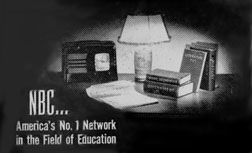Tuning
Out Education
The Cooperation Doctrine in Radio
How did advertising-driven broadcasting establish itself as the dominant user of the airwaves in America? A crucial episode in the story occurred in the 1930s when commercial broadcasters argued successfully that they would put education on the air, and educators should stick to their books.
This paper by Eugene E. Leach, Ph.D., was originally serialized in Current during January, February and March 1983 under the title, "Snookered 50 Years Ago," and was published online Dec. 13, 1999.
Eugene Leach is a professor of history and American studies at Trinity College, Hartford, Conn. He earned his doctorate at Yale University in 1977 and specializes in the cultural and intellectual history of the 19th century, working-class history and multiculturalism. [E-mail]
Author's note
My understanding of the early evolution of educational broadcasting has been molded by the publications of many able historians: Erik Barnouw (A History of Broadcasting in the United States, three volumes, 1966-70); Robert J. Blakely (To Serve the Public Interest: Educational Broadcasting in the United States, 1979); George H. Gibson (Public Broadcasting: The Role of the Federal Government, 1977); Frank Ernest Hill (Listen and Learn: Fifteen Years of Adult Education on the Air, 1937, and Tune In for Education: Eleven Years of Education by Radio, 1942); Harold E. Hill (NAEB History, Volume 1, 1954); and John Walker Powell (Channels of Learning: The Story of Educational Television, 1962).
However, in this narrative, I have tried to advance a new thesis, that the phantom of Cooperation was a potent cause of radio educators' defeats during the '20s and '30s. To substantiate my argument, I have assembled evidence from many underutilized collections in Washington, Madison, New York, Chicago, Ithaca and Columbus. In the following notes, I have chosen to stress these less familiar materials rather than the secondary sources that already are well known to students of broadcasting history.
— Eugene E. Leach, 1983
"Tuning
Out Education: The Cooperation Doctrine in Radio, 1922-38," by Eugene
E. Leach, originally appeared in Current in January, February and
March 1983. Republished on the Web, Dec. 13, 1999. Copyright 1999. Revised Feb. 12, 2007
 Even
as late as 1945, NBC was claiming to be "America's No. 1 Network in the Field of Education." This ad was aimed at educators and plugged the NBC University of the Air.
Even
as late as 1945, NBC was claiming to be "America's No. 1 Network in the Field of Education." This ad was aimed at educators and plugged the NBC University of the Air.